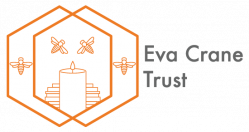Assessing the decline of wild honey production in Palawan, Philippines
Assessing the decline of wild honey production in Palawan, Philippines
Impacts of the Eva Crane Trust grant
The Eva Crane Trust grant awarded to Dr. Denise Margaret Matias during her doctoral studies at the Center for Development Research (ZEF or Zentrum für Entwicklungsforschung) in 2014. The Eva Crane Trust grant covered the equipment, tools, and materials of the field work and allowed for a transdisciplinary development research to be conducted with indigenous peoples of Tagbanua ethnicity who hunt giant honey bees (Apis dorsata) in the UNESCO Man and Biosphere Reserve Palawan in the Philippines. The Eva Crane Trust grant had impacts on both scientific and societal levels.
Scientific impact
The Eva Crane Trust was particularly instrumental in the field component of the doctoral research. With the acquisition of global positioning system (GPS) units, digital cameras, and solar home systems, honey sampling and gathering of GPS coordinates of giant honey bees were facilitated by the grant. The GPS data were processed through spatial analysis and the honey samples were analysed for pollen and pesticide residues. Results were published as five peer reviewed journal articles:
2017
1. Development in Practice 27(7): 903-912 “Mapping giant honey bee nests in Palawan, Philippines through a transdisciplinary approach” https://doi.org/10.1080/09614524.2017.1349735
2. Ambio 46(4): 456-467 “A review of ecosystem service benefits from wild bees across social contexts”
https://link.springer.com/article/10.1007/s13280-016-0844-z
3. Biodiversity and Conservation 26(14): 3499-3504 “Thinking beyond Western commercial honeybee hives: towards improved conservation of honey bee diversity.” https://link.springer.com/article/10.1007/s10531-017-1404-y
2018
1. Ambio 47(8): 924-934 “Ecological changes and local knowledge in a giant honey bee (Apis dorsata F.) hunting community in Palawan, Philippines”
https://doi.org/10.1007/s13280-018-1038-7
2. Forest Policy and Economics 97: 223-231 “Commercializing traditional non-timber forest products: an integrated value chain analysis of honey from giant honey bees in Palawan, Philippines.” https://doi.org/10.1016/j.forpol.2018.10.009
The doctoral research of the project proponent, defended in September 2017, received the highest mark of summa cum laude from the examination committee.
Societal impact
The results of the pollen analysis became the basis of a forest landscape restoration project  focusing on bee-friendly native plant species that are also beneficial to the community. With a funding of 2500€ from the Deutsche Umwelthilfe and Rapunzel’s Hand-in-Hand Fund, Dr. Matias designed a cash-for-work programme with the community she worked with and the indigenous peoples themselves decided on the plant species to collect wildlings from and created a nursery. A total of 6,024 wildlings were directly planted in plots at approximate of 1.5 hectares. This project won the 2018 Innovation Prize of the International Society of Tropical Foresters at Yale University.
focusing on bee-friendly native plant species that are also beneficial to the community. With a funding of 2500€ from the Deutsche Umwelthilfe and Rapunzel’s Hand-in-Hand Fund, Dr. Matias designed a cash-for-work programme with the community she worked with and the indigenous peoples themselves decided on the plant species to collect wildlings from and created a nursery. A total of 6,024 wildlings were directly planted in plots at approximate of 1.5 hectares. This project won the 2018 Innovation Prize of the International Society of Tropical Foresters at Yale University.
Nexus between scientific and societal contributions
Dr. Matias was also one of three awardees of the Josef G. Knoll European Science Award from the Foundation fiat panis in 2018. According to the jury, Dr. Matias was awarded the prize for her “excellent research and important contribution to the linkage of highly marginalized people to agricultural markets. Her research proved the possibility of poverty alleviation in the context of forest conservation and, among others, resulted in the implementation of a reforestation project in the study region. Her work is a very good example of how research can improve the livelihood of remote rural communities in the tropics.”
Summary of the project
Information can also be found on the News page of the Eva Crane Trust Web site.
First phase of funding (2015)
Financial support was sought from The Eva Crane Trust Fund for the participatory resource monitoring (PRM) component of the doctoral research project “Sustainability of community forestry enterprises: indigenous wild honey gathering in the UNESCO Man and Biosphere Reserve Palawan, Philippines” formerly entitled “Assessing the decline of wild honey production in Palawan, Philippines”. The first phase of the financial support from The Eva Crane Trust Fund supported the community training on the use of global positioning system (GPS) units and point-and-shoot cameras. This was conducted in February, 2015 in the community of Sagpangan in Aborlan, Palawan with around 30 participants, consisting of Apis dorsata hunter-gatherers and female community members.
From April 2015 up to June 2015, the hunter-gatherers voluntarily mapped through the use of GPS units the giant honey bee nests they gathered honey from. They were able to map 31 bee nests, which became the basis for further spatial analysis. Results of this mapping were published as a research article in Development in Practice 27(7): 903-912 entitled “Mapping giant honey bee nests in Palawan, Philippines through a transdisciplinary approach.” In lieu of sampling leaves and photo documentation of nesting trees, honey samples were collected and analysed for pollen content in cooperation with Dr. Anne-Marie Semah of IRD-Sorbonne.
Second phase of funding (2018)
The second phase of funding was used to fund a training on the use of GPS and digital cameras by several indigenous communities in Palawan. Conducted in March 21-23, 2018 at Narra, Palawan, Philippines, representatives of indigenous Palaw’ans from Brooke’s Point, Quezon, Rizal and indigenous Tagbanuas from Narra attended. Two representatives from Sagpangan who attended the first training were also present to share their experiences and assist during the training. Non-Timber Forest Products Exchange Programme (NTFP-EP) Philippines staff attended the training and also assisted with the preparations.
Dr. Denise Margaret Matias


